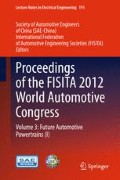Abstract
Due to the shock caused by unstable transmission of power in the mode-switch process and the difficulty of obtaining engine torque in real time, a dynamic coordinated control strategy for mode-switch of hybrid electric vehicle based on the effect control is put forward. The control strategy of engine torque is designed, which is used to reduce the abrupt changes of engine torque by limiting its changing slope. Motor torque control strategy based on motor speed closed-loop is proposed, motor speed taken as feedback control variable is easy to be measured accurately in real time. It avoids the problem of inaccuracy engine torque estimation. A simulation model is built on the platform of Matlab/Simulink and AEMSim. The results show that the dynamic coordinated control strategy can make the fluctuation of motor speed and vehicle speed decreased and effectively improve the vehicle’s ride comfort.
F2012-B02-043
National "863" High-tech Projects (2011AA11A208); Beijing Excellent Talent cultivation (2011D009004000001)
Access this chapter
Tax calculation will be finalised at checkout
Purchases are for personal use only
References
Ji E (2006) Study on the coordinated control for mode-switch of parallel hybrid electric system. Ji Lin University
Tong Y, Ouyang M, Zhang J (2003) Real-time simulation and research on control algorithm of parallel hybrid electric vehicle. Chiese J Mech Eng 39(10):156–161
Yang Y, Wenhui Y, Datong Q, Zhihui D (2011) Coordinated torque control strategy for driviung-mode-switch of strong hybrid electric vehicle. J Chongqing Univ 34(2):74–81
Douba M, Ng H, Larsen R (2001) Characterization and comparison of two hybrid electric vehicles(HEVs)-honda insight and toyota prius. In: SAE 2001-01-1335
Li K, Chen T, Luo Y (2009) A new concept of intelligent environmental friendly vehicle . China, CN200810223099, 2009.2.4(In Chinese)
Yifan D (2009) The control strategy for a new full hybrid powertrain structure. Automot Eng 31(10):919–923
Hu A (2006) The research of regenerative braking system based on AMEsim-Simulink co-simulation. Ji Lin University
Jin L (2004) United simulation technique with AMEsim and Matlab/Simulink [J]. Inf command control syat simul technol 26(5):62–64
Author information
Authors and Affiliations
Corresponding author
Editor information
Editors and Affiliations
Rights and permissions
Copyright information
© 2013 Springer-Verlag Berlin Heidelberg
About this paper
Cite this paper
Zhang, N., Zhao, F., Luo, Y. (2013). A Dynamic Coordinated Control Strategy for Mode-Switch of Hybrid Electric Vehicle Based on the Effect Control. In: Proceedings of the FISITA 2012 World Automotive Congress. Lecture Notes in Electrical Engineering, vol 191. Springer, Berlin, Heidelberg. https://doi.org/10.1007/978-3-642-33777-2_34
Download citation
DOI: https://doi.org/10.1007/978-3-642-33777-2_34
Published:
Publisher Name: Springer, Berlin, Heidelberg
Print ISBN: 978-3-642-33776-5
Online ISBN: 978-3-642-33777-2
eBook Packages: EngineeringEngineering (R0)

